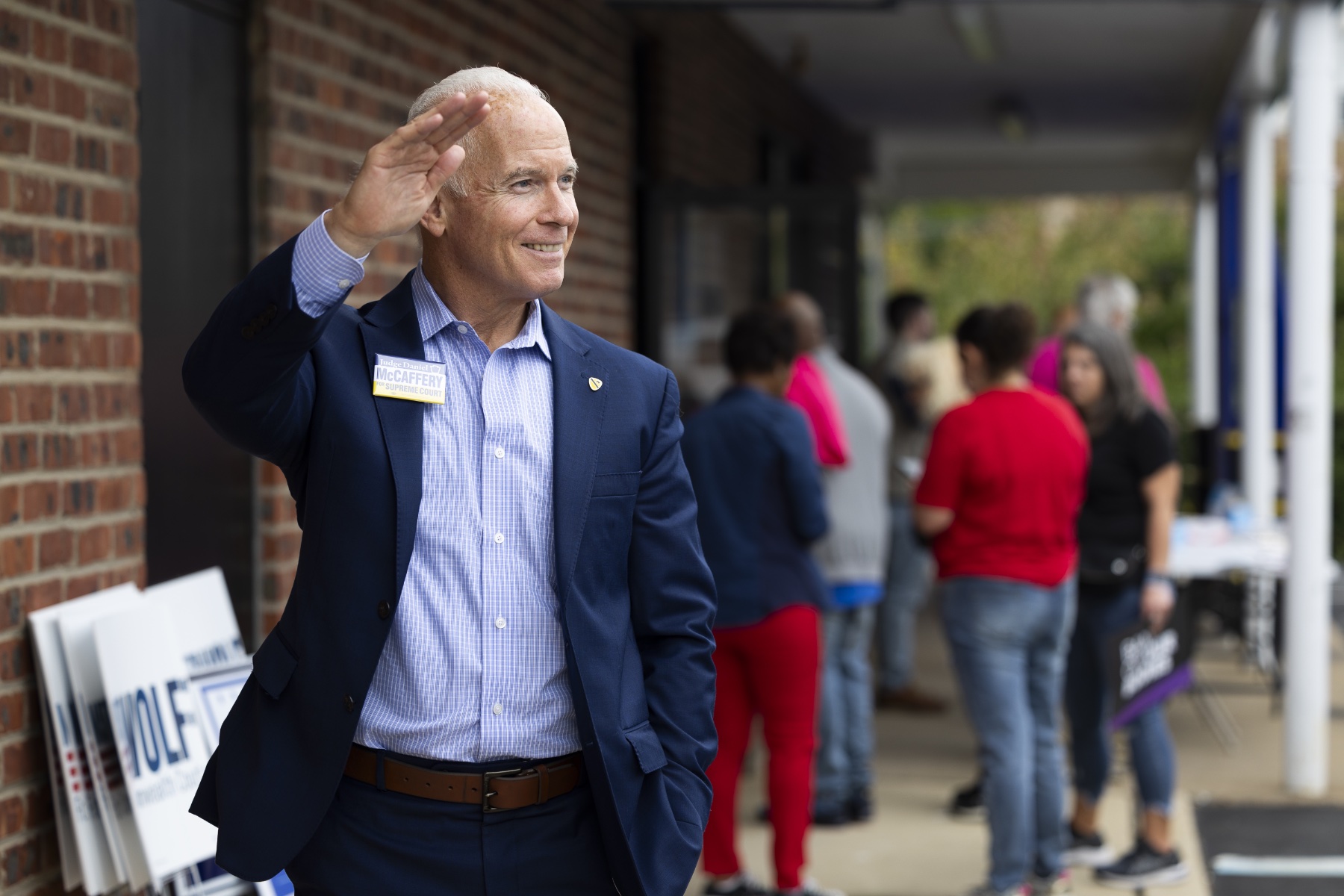After a bruising campaign that is likely to set a new record as the state’s most expensive judicial race ever, Democrat Dan McCaffery is the projected winner of the vacant seat on Pennsylvania’s Supreme Court.
Spending on the campaign topped $17 million by the end of October, campaign financial disclosures show, with large sums coming from conservative billionaires as well as reproductive rights organizations like Planned Parenthood Votes, the political arm of Planned Parenthood.
Unlike in neighboring Ohio, abortion was not explicitly on the ballot in Pennsylvania this year. And the election was not going to alter the balance of the state’s highest court, where Democrats held a 4-2 majority.
But the terms of three of the Democratic justices on the court will be up in 2025. Gov. Josh Shapiro is a staunch abortion rights supporter who terminated state funding for Real Alternatives anti-abortion centers. But he has been rumored to have presidential aspirations. So Pennsylvania, mostly considered a “safe” state for abortion rights, could see the balance of power change relatively quickly in just a few years’ time.
“Pennsylvania is one of only seven states in the entire country when we vote for all of our judges in partisan elections,” said Kadida Kenner, CEO of voting rights organization the New Pennsylvania Project. “It gives us lots of power as a voter.”
When the Dobbs decision overturning Roe v. Wade came in 2022, she added, it was clear abortion would be an issue for states to grapple with. “By punting Roe v. Wade down to the states, that just makes our state courts even more powerful and in need of protection, and in need of justices who will protect our rights and freedoms,” Kenner said.
Reproductive Freedom for All (RFFA) Vice President of Political and Government Relations Ryan Stitzlein said advocacy groups saw a preview of what’s playing out now in Pennsylvania in 2022, when Shapiro defeated anti-abortion Republican candidate Doug Mastriano, and Democrats regained control of the state House. Stitzlein said these helped add some protection.
“But if those elections had gone a different way, we very likely could be facing an abortion ban in Pennsylvania. These aren’t idle threats,” he said. “This is a deeply impactful election for abortion access.”
RFFA made only its second-ever endorsement in a judicial race when it announced in October that it was backing McCaffery.
After Roe was overturned, reproductive rights organizations became determined to keep abortion front and center in every election, and force anti-abortion candidates to own a stance that is increasingly unpopular with voters, Stitzlein added.
“Republicans started to really see just how toxic their position of abortion is with voters, and try to use the playbook of obfuscation, of confusing or misleading voters about what their position actually is,” Stitzlein said.
Indeed, during the campaign, TV ads hammered Carluccio for removing her anti-abortion stances from her campaign website not long after she won the May primary, suggesting she was trying to hide her position. The Carluccio campaign has said the website simply underwent a redesign. But Carluccio was endorsed by the PA Pro-Life Federation and Pro-Life Coalition of Pennsylvania, both of which oppose abortion.
“Last year we saw in Wisconsin how effective it really is to communicate with voters early and often about Supreme Court races and where candidates stand on the issues,” said Planned Parenthood Votes campaign director Breana Ross. “That was really a turning point for us.” The organization made its largest-ever investment in a judicial race this year, to support McCaffery.
Record-setting spending
Of the total raised for the state Supreme Court race, Carluccio’s campaign received $4.4 million from the Commonwealth Leaders Fund, which is funded by Pennsylvania billionaire Jeffrey Yass. Fair Courts America, a super PAC funded by billionaire Richard Uihlein, spent more than $700,000 on an ad attacking McCaffery. That’s been another point where Democrats have tried to keep the focus: that wealthy people are trying to wield control over elections and courts to serve their own interests, which often includes restricting reproductive choice.
“Voters, more than anything else, want to think that the person that they’re electing shares their values,” said Kathy Boockvar, former Pennsylvania Secretary of the Commonwealth. “One of the worst things about how our elections work and how our campaign financing works, is that a lot of the time, the candidate with the most money wins.” Most voters usually know very little about candidates, she added. “So more information is always good.”
Boockvar added that concern about actions that anti-abortion politicians might take if given the opportunity is legitimate. Republicans in the Pennsylvania legislature tried to push through a constitutional amendment to effectively ban abortion in the state just last year, she noted, an effort thwarted when Democrats won control of the House.
“There’s absolutely reason to fear, particularly as we see what’s happened in other places, and what our own legislature, at least the Senate, was trying to do,” Boockvar said.
Ashley Ehasz, a Democrat running her second campaign against U.S. Rep. Brian Fitzpatrick (R-1st District) said abortion is an issue that has only gained momentum since Roe was overturned, but it’s been in the campaign conversation well before that.
“I think sometimes it’s hard for folks to remember but back in October of ‘21, there was already a sense that abortion rights might be on the line, especially with the makeup of the Supreme Court, but it hadn’t actually happened yet,” she said.
But now, when she knocks on doors, people in her district are actively talking about it, and she has not had trouble convincing people that 2024 will have abortion rights on the ballot. After Fitzpatrick cast his vote for conservative Rep. Mike Johnson (R-La.) as Speaker of the House, “I couldn’t keep up with the phone calls that were coming in from folks here in the district. They were scared,” she said.
Voters raise expectations
Among those who have grown more concerned about restrictions on abortion are Republican women, Kenner added.
“This will remain an issue in Pennsylvania because both Democrats and Republican women have abortions,” she said. “And I think the realization is, ‘Oh my goodness, I might need an abortion. My daughter might need an abortion and I can no longer just count on Democrats to protect my reproductive rights.’”
Voters have grown more savvy about what they expect from judicial candidates, she added, and about the questions they want the candidates to answer about how they’ll perform when they’re on the bench. Kenner said that’s especially true after seeing nominees to the U.S. Supreme Court testify that they considered Roe v. Wade to be “settled law,” only to then vote to overturn it as justices.
“There’s a trust factor that voters have right now with our judiciary,” Kenner said.
J.J. Abbott, who previously worked in the administration of Democratic Gov. Tom Wolf, is executive director of Commonwealth Communicators, which works on progressive issues and campaigns. He said in Democratic strategy circles, the issue of abortion is viewed as one that will motivate voters to turn out, but can also be a disqualifier if candidates are not clear on their positions.
He pointed to Dr. Mehmet Oz, the losing candidate in the 2022 U.S. Senate race in Pennsylvania, whose position on abortion appeared to shift over time. To voters, Abbott said, “That’s not good enough.”
For Planned Parenthood Votes, investing in state Supreme Court races is a long-term strategy, Ross said. “We want to make sure we have justices that will protect abortion. And this is really a decades-long fight.”
After McCaffery was declared the winner, Deirdre Schifeling, chief political and advocacy officer for the American Civil Liberties Union called the Democrat’s victory a backstop against potential future attacks on reproductive freedom
“We will continue this fight until every person in our country has access to abortion and all reproductive health care — it is fundamental to equality and is a basic human right,” she said.
Pennsylvania Capital-Star is part of States Newsroom, a network of news bureaus supported by grants and a coalition of donors as a 501c(3) public charity. Pennsylvania Capital-Star maintains editorial independence. Contact Editor Kim Lyons for questions: [email protected]. Follow Pennsylvania Capital-Star on Facebook and Twitter.





